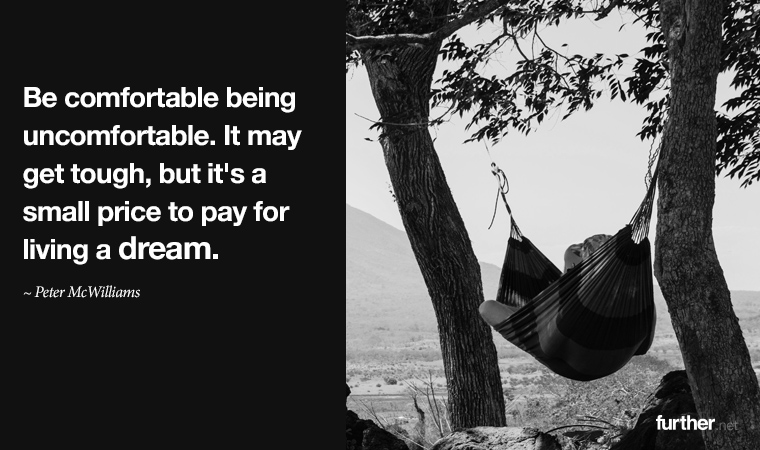
Since I started publishing Further a year-and-a-half ago, it’s become clear that exercise is somewhat miraculous. And I don’t mean just in the physical sense.
Exercise enhances your brain in real ways, heightens awareness, and can help you overcome depression. And we know that vigorous, high-intensity exercise provides bigger benefits, faster.
One thing that comes with the territory of a high-intensity workout is discomfort. In fact, people who commit to a lifestyle that includes vigorous exercise learn to get comfortable with being uncomfortable.
And this brings yet another valuable benefit. You learn to deal with life in a more well-adjusted way.
Endurance athletes of all kinds train themselves to keep going when it starts to hurt. And research shows that this spills over when encountering life stress — it just doesn’t seem like that big a deal, relatively.
You don’t have to train for an Iron Man to benefit, though. Here’s an excerpt from a Science of Us article on the topic:
- A study published in the British Journal of Health Psychology found that college students who went from not exercising at all to even a modest program (just two to three gym visits per week) reported a decrease in stress, smoking, alcohol and caffeine consumption, an increase in healthy eating and maintenance of household chores, and better spending and study habits.
As an 18-year serial entrepreneur, I’m comfortable in plenty of situations that make others uncomfortable — uncertainty, rapid change, making hard decisions. But when it comes to physical stuff, I’ve admittedly been a big wimp.
I’m starting to change that by embracing — even relishing — the struggle it takes to climb a steep trail. And I started feeling that other stressors in my life were more manageable even before I found this conclusion:
- What you do in the gym (or on the roads, in the ocean, etc.) makes you a better, higher-performing person outside of it.
In short, vigorous exercise goes well beyond physical fitness, as important as that is to your health and longevity. Life fitness may be smarter way to think about it.
How Exercise Shapes You, Far Beyond the Gym
Keep going-
Brian Clark
Further
further: health
Who’s Your Dealer?
The global market for “dietary supplements” was $82 billion as of 2013, with the U.S. accounting for more than a quarter of that. Much of this is attributed to the fact that these products can go to market without any safety, purity, or quality testing by the FDA.
Why Vitamins and Other ‘Dietary Supplements’ Can Contain Anything
Sugar, Baby
Sugar is everywhere in our food, and not just the obvious places. So how do you know if you’re eating too much? Here are eight red flags your body is sending you that it’s time to cut back on the sweet stuff.
8 Signs You’re Eating Too Much Sugar
Mediterranean Fat
Amidst all the debate over how saturated fat and PUFAs differentially affect our health, we often forget about monounsaturated fats, or MUFAs. But they’re an afterthought in hard core nutrition geek circles.
10 Reasons You Should Be Eating More Monounsaturated Fat
further: wealth
Your Special Purpose
Generational differences don’t matter; everyone wants meaningful work. Experts explain why the way we think about motivation is all wrong.
Millennials Aren’t More Motivated By “Purpose” Than The Rest Of Us
Humble Pie
Stress and anxiety at work are linked to a future outcome. If you relate to your outcomes in a humble manner, however, and allow yourself to have a different result than desired, there’s less to stress over.
This Personality Trait Can Lessen Your Stress and Anxiety
Job Leverage
You’ve probably heard this before: “The only way to get a raise is to get another job offer.” Is it true? This piece features expert advice on whether this oft-given advice holds up in practice and against research.
Setting the Record Straight: Using an Outside Offer to Get a Raise
further: wisdom
Bias Confirmation
Imagine you’ve recently gone through a breakup and want to get over your ex. You decide to make a mental list of all of their character flaws in an effort to feel better about the relationship ending. You know you’re biased, so will it work?
We’re All Biased, but That Doesn’t Keep Us from Making Valid Decisions
Habitual Storytelling
The story you tell yourself about your habit matters more than most people realize. So the key is to shape the story, become your own habit storyteller, and create a story that will make you more likely to stick to the habit.
To Create a Habit, Tell a Good Story
Simple Motivation
Psychologists tested three common motivational techniques to see which works best. Thinking “I can do better” really can help improve performance, new research finds.
The Simplest Motivational Technique May Also Be The Best
further: sharing
Please forward this issue of Further to a friend who could benefit from it. Or use these easy social options:
